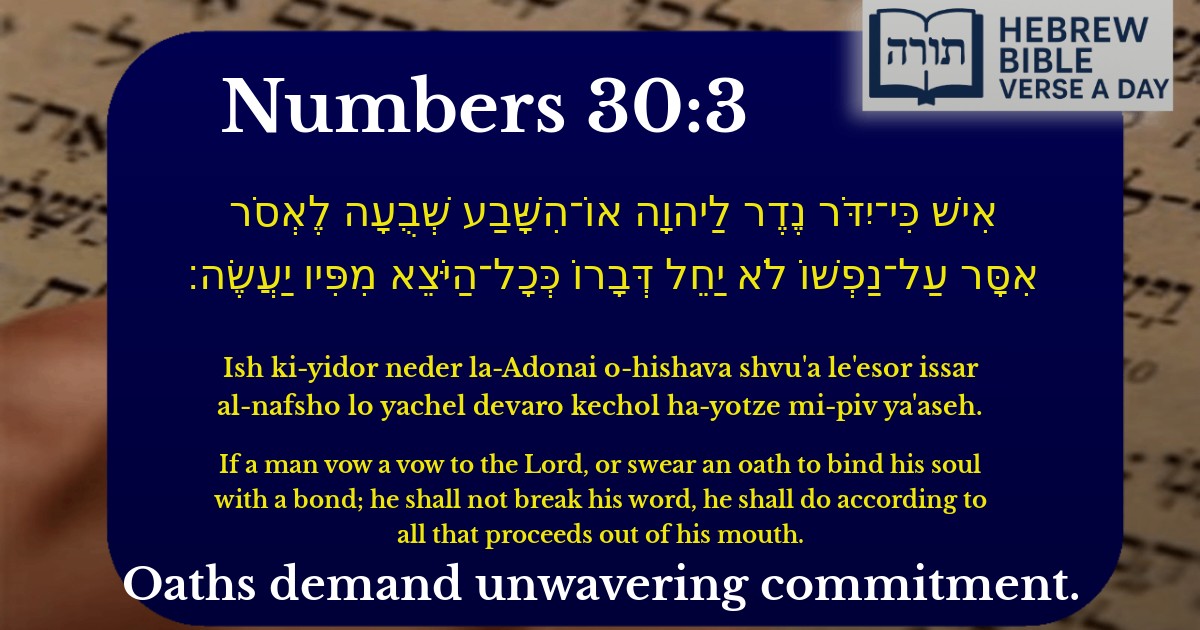Join Our Newsletter To Be Informed When New Videos Are Posted
Join the thousands of fellow Studends who rely on our videos to learn how to read the bible in Hebrew for free!
Hebrew Text
אִישׁ כִּי־יִדֹּר נֶדֶר לַיהוָה אוֹ־הִשָּׁבַע שְׁבֻעָה לֶאְסֹר אִסָּר עַל־נַפְשׁוֹ לֹא יַחֵל דְּבָרוֹ כְּכָל־הַיֹּצֵא מִפִּיו יַעֲשֶׂה׃
English Translation
If a man vow a vow to the Lord, or swear an oath to bind his soul with a bond; he shall not break his word, he shall do according to all that proceeds out of his mouth.
Transliteration
Ish ki-yidor neder la-Adonai o-hishava shvu'a le'esor issar al-nafsho lo yachel devaro kechol ha-yotze mi-piv ya'aseh.
Hebrew Leining Text
אִישׁ֩ כִּֽי־יִדֹּ֨ר נֶ֜דֶר לַֽיהֹוָ֗ה אֽוֹ־הִשָּׁ֤בַע שְׁבֻעָה֙ לֶאְסֹ֤ר אִסָּר֙ עַל־נַפְשׁ֔וֹ לֹ֥א יַחֵ֖ל דְּבָר֑וֹ כְּכׇל־הַיֹּצֵ֥א מִפִּ֖יו יַעֲשֶֽׂה׃
Parasha Commentary
📚 Talmud Citations
This verse is quoted in the Talmud.
📖 Nedarim 2a
The verse is discussed in the context of the laws of vows and oaths, particularly regarding the seriousness of making and keeping vows to the Lord.
📖 Shevuot 26b
This verse is referenced in discussions about the binding nature of oaths and the consequences of breaking one's word.
📖 Rosh Hashanah 6a
The verse is cited in a broader discussion about the importance of fulfilling one's vows and the divine expectation for honesty in speech.


The Sanctity of Vows and Oaths
The verse (Bamidbar 30:3) establishes the fundamental principle that one must fulfill their vows and oaths to Hashem. Rashi explains that the phrase "לֹא יַחֵל דְּבָרוֹ" ("he shall not break his word") teaches that one who fails to keep their vow desecrates (חִלּוּל) their word, treating it as unholy. This underscores the severity of making commitments to Hashem.
Types of Vows and Oaths
The Rambam (Hilchot Nedarim 1:1-2) distinguishes between two types of commitments mentioned in the verse:
The Gravity of Verbal Commitments
The Talmud (Nedarim 8a) derives from "כְּכָל־הַיֹּצֵא מִפִּיו יַעֲשֶׂה" ("he shall do according to all that proceeds out of his mouth") that even unspoken intentions can create binding obligations if they are clear in one's heart. This teaches the immense power of speech in Jewish thought.
Halachic Implications
The Shulchan Aruch (Yoreh De'ah 203) rules that one who violates a vow transgresses a Torah prohibition. However, the Sages instituted mechanisms for הַתָּרַת נְדָרִים (annulment of vows) under specific circumstances, emphasizing that vows should not be taken lightly (Pirkei Avot 3:13).
Moral Lesson from the Verse
The Midrash (Bamidbar Rabbah 22:1) connects this verse to the concept of אֱמֶת (truth), teaching that a person's word must be as reliable as if it were given before Hashem Himself. This reflects the broader Jewish value of integrity in speech and action.